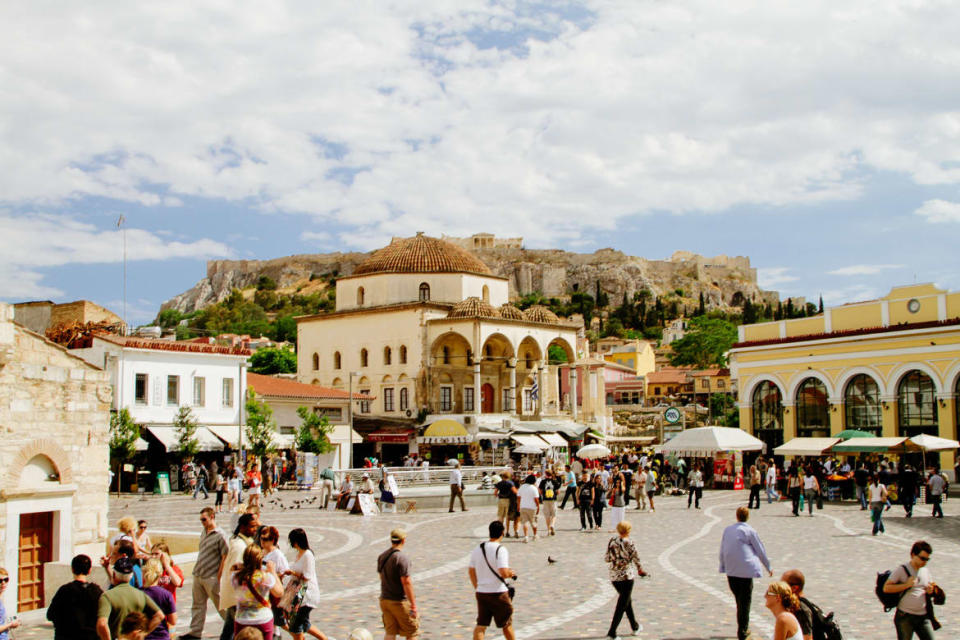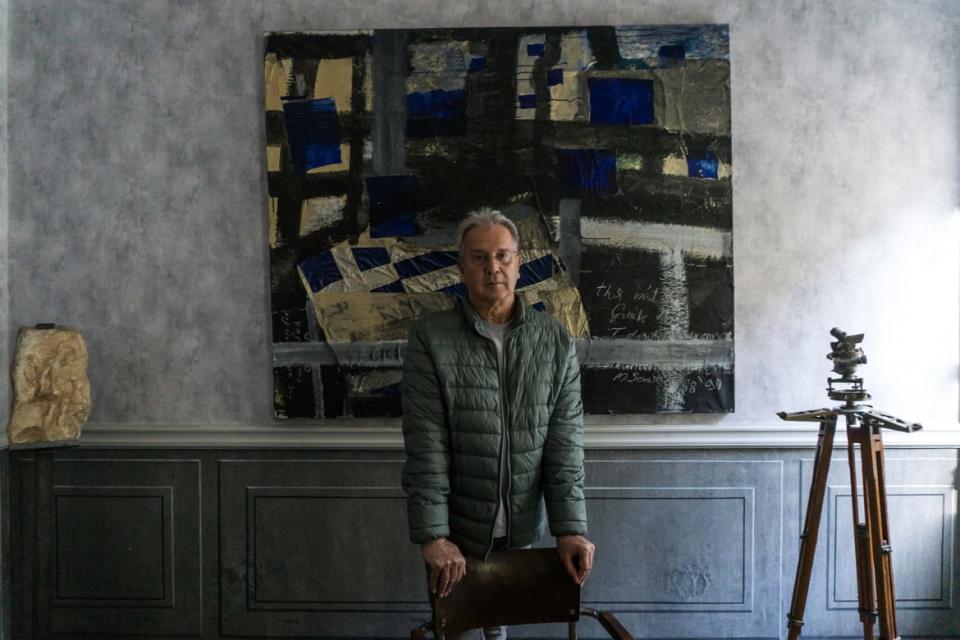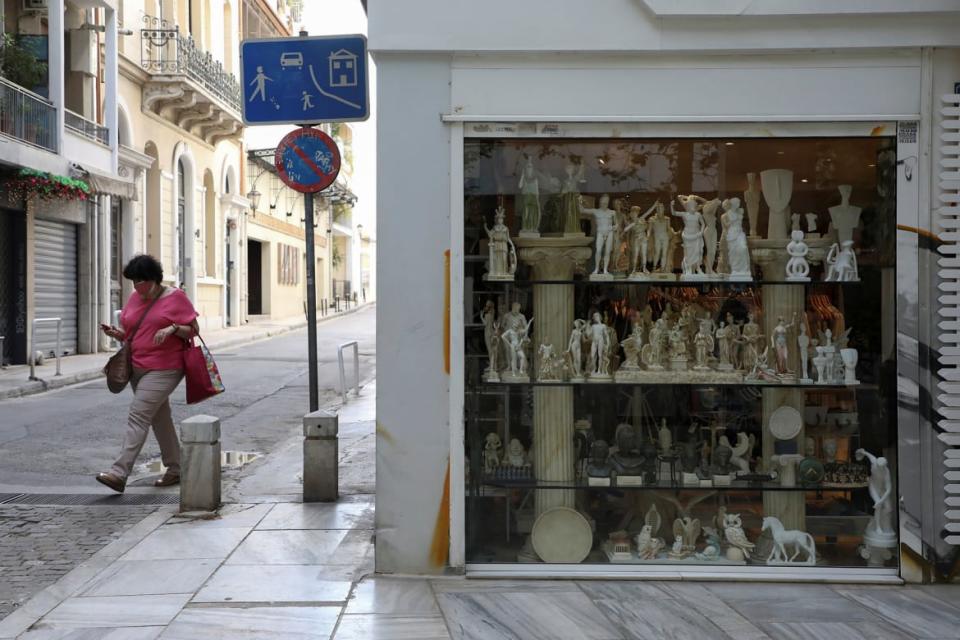Tourists Are Destroying Athens’ Most Beautiful Neighborhood

- Oops!Something went wrong.Please try again later.
Architect Giorgos Zafeiriou has been living in Plaka, Athens’ historic neighborhood under the Acropolis hill, almost half of his life. The building he bought and renovated 35 years ago is a three-story apartment more than 130 years old. He uses the first floor as his office and the other two, all connected with a beautiful wooden staircase, as his home. From the terrace he can see the Parthenon up close. His view, however, is not entirely unique. All buildings in this area have a very close view to the Parthenon, a temple dedicated to goddess Athena and the landmark of Athens. That amazing view and the colorful old buildings with the blooming bougainvilleas crawling from the balconies, are why this area is so popular with tourists who flock its narrow streets all year long.
But lately, some of its permanent residents are finding the views just aren’t worth it any more.
Over-tourism of the last couple of years has taken away from them the joy of living in one of the most beautiful neighborhoods of Athens. “When somebody tells me ‘What a beautiful neighborhood you live in’, I usually reply by ‘Thank you, but I want to keep living in here and the neighborhood to continue being beautiful’”, Zafeiriou, who is the president of the committee of Plaka residents initiative, usually jokes. While most of Athens is packed with ugly concrete apartment buildings, Plaka is unique. The expansion of the Greek capital started in the early 1950s after the Greek civil war ended, and many left the wartorn countryside and moved to the capital, raising the need for housing. As a result many apartment buildings had to be created as fast as possible, all similar to each other, block after block. At the same time, the city’s best-preserved neighborhood managed to keep its own architecture. Whether it’s a smaller stone-built house or a neoclassical building, Plaka always had a different vibe making it stand out from the rest of the city.

Since Greece raised all COVID-19 travel restrictions in May 2021, travelers have been coming to the country en masse. This past year unexpectedly saw the country already returning to pre-pandemic levels. According to official data from GBR Consulting, Greece attracted a total of nearly 28 million international tourists spending €17.5 billion ($18.6 billion). Almost every one of them who had Athens as their final destination, or had a layover in the Greek capital, has walked around the streets of Plaka. It’s a must-see place to visit when you find yourself in Greece’s largest city and, along with popular islands such as Mykonos and Santorini, it’s one of the most Instagrammable areas in the country. But the exact thing that draws the tourists in has a negative effect on the about 1,500 permanent residents who have seen Athens’ oldest district changing dramatically over the years.
On a recent event for the protection of Plaka organized by the Society for the Environment and Cultural Heritage (ELLET), Maria Kokkinou, a permanent resident, spoke in front of an audience that included the mayor of Athens, Kostas Bakoyiannis, about what they have been dealing with the first post-pandemic years.
“We had a very difficult summer, sleeping with earplugs and closed windows because even the double glazing cannot limit the noise. The traffic is unbearable, Plaka is full of black vans with tinted windows blocking the streets, taking up our parking spaces.” She also issued a warning: “If we all leave and all the houses become tacky souvenir shops, the tourists will stop coming too.”
Zafeiriou could not agree more.
“Plaka has had a presidential decree since 1999 that fully protects it from all of that,” he says, and according to the decree, no new hotels are allowed in the area. But instead of new hotels it has been filled with Airbnbs and there are strict land uses that are not respected. Restaurants cannot make noise and their chimneys cannot emit odors, but both are happening. Also, they cannot extend up to other floors and the roof of the building where the restaurant is hosted, but every summer more and more rooftop bars, cafes and restaurants open. On top of that, speakers from restaurants and bars play loud music of different genres blending with each other all night long, keeping the residents sleepless for days and the tourists confused. So basically nothing mentioned in the decree is followed.

"Architect Giorgos Zafeiriou."
“In the last two years the situation has become unbearable. There are days when you literally leave your house and can't take a step. There is a general relaxation of land uses. This has started in the last decade and has slowly peaked,” says Lydia Carras, president of ELLET and a local in the area.
When Carras first arrived at Plaka she had just been engaged with her husband Costa, and they were determined to resettle in a long-abandoned house that belonged to her husband’s family. At that time the whole area was meant to be demolished and a park to be created there. She, with her husband and other locals, fought hard to avoid this. Some politicians believed in their dream and Plaka slowly started becoming what we know today. But lately that has started changing again. “This happiness lasted for about 20 years,” she says. “Now we are going back to what we experienced 50 years ago”.
What the residents of this historic district, which has been continuously populated for over 5,000 years, ask is basically one thing: They just want the abuse of public space to end and the laws to be followed by everyone. “To be fair, Airbnb has helped a lot of empty and abandoned buildings to be renovated and be used again, but there must be a limit. Not everything can be Airbnb. It needs to be controlled” Zafeiriou says.
“At least four or five houses have been abandoned by their owners in recent years and some have started to feel so uncomfortable that they are now seriously considering leaving,” contends Zafeiriou, who fears that if nothing happens soon, then this summer season, when Greece is expected to welcome more visitors than ever before, things might be catastrophic for the locals.
“All historic city centers if they lose their inhabitants after a while they languish,” he adds.

A woman walks by a tourist shop in Plaka district
At the end, Carras points out, tourists are also overwhelmed with the situation and they too begin to resent it. Zafeiriou agrees: “If you disappoint the tourist with what is happening, you will create a bad image. If they can't get around, if they trip on the sidewalk, if the road is bad or crowded. Do you know how many tourists I’ve seen twisting their legs on the street?”.
To avoid all this the Plaka committee has composed official proposals on how everything can be solved. For the noise pollution they suggest a plan similar to what is applied in Paris. External sound meters will measure the volume of the music, and when it is higher than normal, the violator will be fined accordingly. As for the odors, they suggest removing all the chimneys and putting carbon filters which trap the smell. Regarding the rooftops, they suggest the use of drones to scan the area and photograph all the businesses violating the law. So far very little has changed and their next step is to go talk to the owners of those businesses themselves and hope for the best. “We sent our proposals to the Municipality of Athens and we are waiting. Nothing has happened yet,” says Zafeiriou.
“The state and the municipality must really look after Plaka at all costs. Plaka has something unique and must be protected. And this must be done now before all the residents leave again,” Carras warns.
Get the Daily Beast's biggest scoops and scandals delivered right to your inbox. Sign up now.
Stay informed and gain unlimited access to the Daily Beast's unmatched reporting. Subscribe now.

